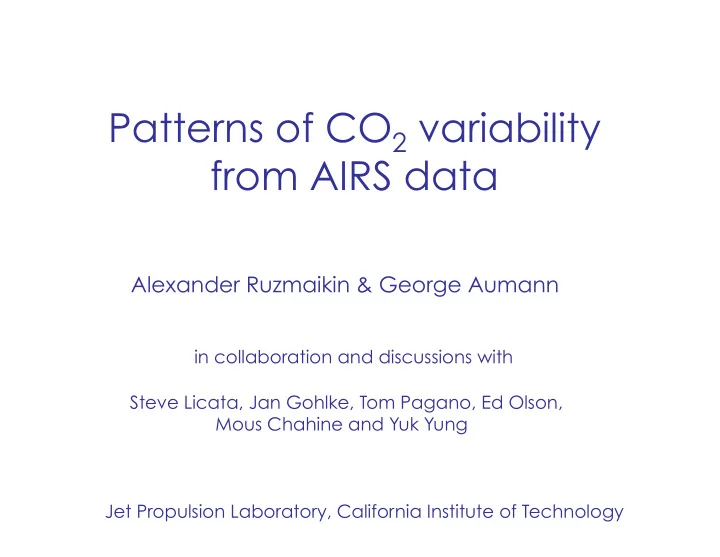

Patterns of CO 2 variability from AIRS data Alexander Ruzmaikin & George Aumann in collaboration and discussions with Steve Licata, Jan Gohlke, Tom Pagano, Ed Olson, Mous Chahine and Yuk Yung Jet Propulsion Laboratory, California Institute of Technology
Motivation AIRS provides almost 8-year long global CO2 concentration in mid-troposphere (Chahine et al. 2008) Currently the AIRS CO 2 distribution is not reproduced by models Try pattern recognition techniques
Approach: Data & Methods We examine the global 7-year long (2003-2009) mid-tropospheric CO 2 retrievals obtained from the measurements by the Atmospheric Infrared Sounder (AIRS) and its companion instrument, the Advanced Microwave Sounding Unit (AMSU), onboard of Aqua spacecraft. The data are L2 monthly means on a 1° x 1° grid and L3 on 2° x 2.5° grid. The Spatial patterns and their time variability are evaluated using Principal Component Analysis (PCA). We also probing 2D Empirical Mode Decomposition.
Mean and SDT in Each Pixel o Does not take into account correlations between pixels o Time variability is lost
Evolution of Zonal Mean o Not easy to interpret due to NS asymmetric time variability
Principal Component Analysis (PCA) CO 2 (x, y, t) = <CO 2 (x, y)> + Σ PC k (t) EOF k (x, y), k where <CO 2 > is the time mean and the sum refers to anomalies. To calculate EOFs, their variances, and PCs we use SVD code in Matlab.
What do we get from PCA? Jin-Yi Yu
% of Variance Explained by Each EOF λ 1 = 92.2%, λ 2 = 3.5%, λ 3 = 2.0%, ...
First EOF & PC Trend Pattern
Second EOF & PC
Third EOF & PC
Fourth EOF & PC
PC1 and Mauna Loa Record
AIRS PC1 MLO data noise semi-annual annual Nino range trend
Evolution of Zonal Means for First EOFs
Preliminary Conclusions Major structure (first EOF) explains more than 92% of variance and trend MLO site closely reflects the variability of the major structure The other structures (next EOFs) show annual and semi-annual variability The third EOF shows a pattern in Southern hemisphere seen at specific times by Chahine et al. (2008) Causes of structures are under investigation
References • Chahine, M. T., L. Chen, P. Dimotakis, X. Jiang, Q. Li, E. T. Olson, T. Pagano, J. Randerson and Y. Yung (2008), Satellite remote sensing of mid-tropospheric CO2, Geophys.Res. Let., 35, L17807, doi:10.1029/2008GRL035022. • Preisendorfer, R. W. (2007), Principal Component Analyses in Meteorology and Oceanography, Elsevier Pbls. • Huang, N. E. and Z. Wu, Review on Hilbert-Huang Transform, Reviews of Geophysics, 46, 1, 2008.
Recommend
More recommend